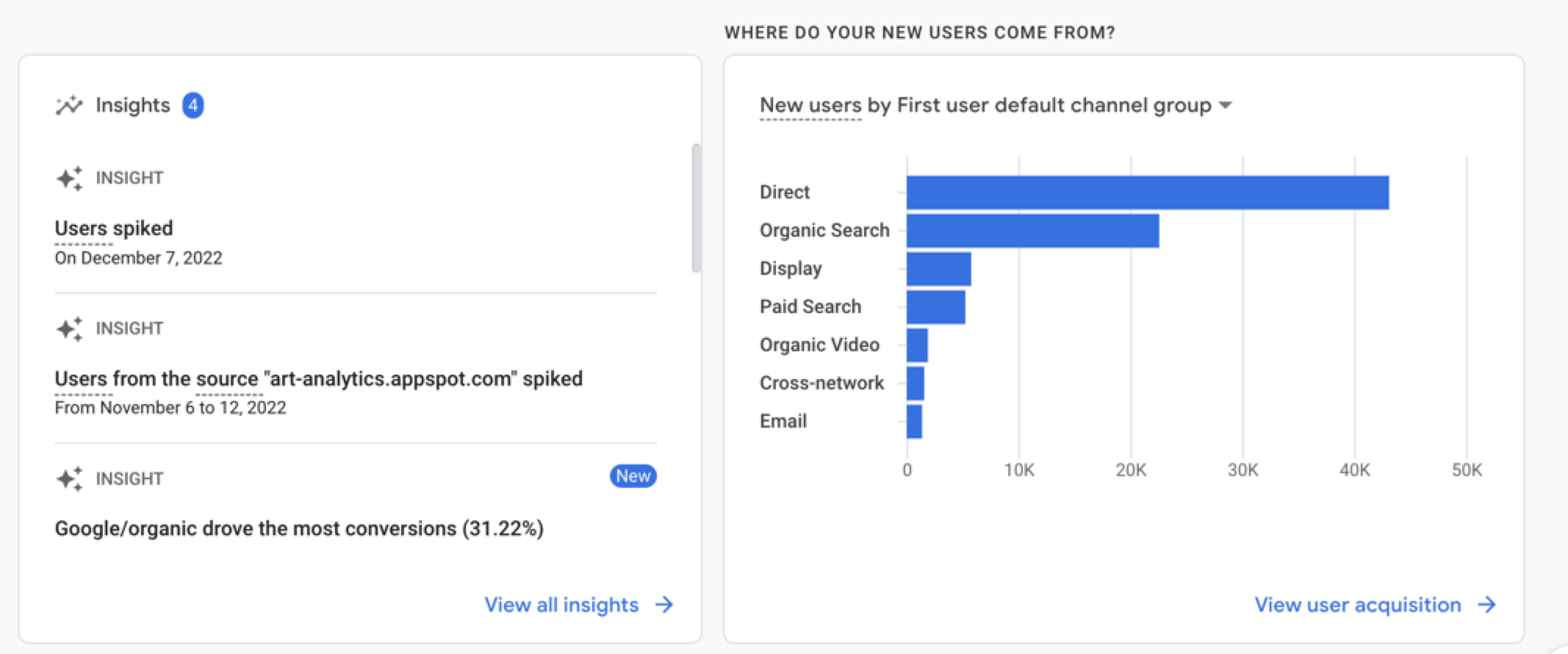-
 Published: Dec 15, 2022
Published: Dec 15, 2022
-
 6 min. read
6 min. read
-
 WebFX Team
WebFX Team Digital Marketing Agency
Digital Marketing Agency
- The WebFX team is made up of more than 450 subject matter experts in digital marketing, SEO, web design and web development, social media, and more. Together, they’ve helped WebFX’s clients earn more than $3 billion in revenue from the web — and that’s just in the past five years. @webfx
What is lead tracking?
Lead tracking is the process of monitoring and analyzing the journey of potential customers, from their initial interaction with a website or advertisement to their conversion into actual leads, in order to optimize marketing strategies and increase sales.
Your leads significantly impact your company’s success, influencing your conversions, revenue, and organizational longevity. That’s why you must track your leads to determine their quality, decide which leads to focus on, and assess the effectiveness of your marketing strategies.
Lead tracking is a critical part of any lead generation plan. This post will cover the lead tracking basics — what it is, how to do it, and why it matters. Read on to learn more!
Don’t miss our Marketing Manager Insider emails!
Join 200,000 smart marketers and get the month’s hottest marketing news and insights delivered straight to your inbox!
Enter your email below:
Inline Subscription Form – CTA 72
“*” indicates required fields
(Don’t worry, we’ll never share your information!)

The basics of lead tracking
Before you track leads, let’s cover some basics.
What is lead tracking?
Leads refer to any individual who demonstrates interest in your product or service. Lead tracking is the process of determining the source of these leads and actively monitoring their places in the marketing funnel or sales pipeline.
Your lead tracking system categorizes customers based on their activities and behavior and estimates their likelihood of making a purchase. Lead tracking lets companies concentrate these leads further down the funnel, increasing conversions and ultimately boosting revenue.
Why is it important to track leads?
Lead tracking matters because it offers the following benefits:
- Improving understanding: When you track your leads, you develop a deeper understanding of your customers. That means you can reach your target audience with relevant product and service matches in a way that resonates.
- Informing strategies: The more information you gather from your lead tracking efforts, the better you can pinpoint which strategies are working and which aren’t — and adjust accordingly.
- Optimizing marketing activities: You can use your lead data to develop more informed marketing strategies, minimizing your risks and boosting your lead quality.
How does lead tracking work?
Lead tracking requires extensive planning and coordination. Many companies use specialized lead tracking software to pinpoint inquiry originations and monitor prospects throughout the marketing funnel. These tools make it easier for marketers to accurately maintain accounts of their leads, sales, and return on investment (ROI).
One you have the proper technology in place, you can track leads by following a few best practices.
1. Capture leads
There’s no shortage of ways to capture leads for your business. You might use data from trade shows and other in-person events, web form statistics, and transcripts from inbound phone calls.
Some digital lead generation examples include:
- Search engine optimization
- Email lead nurturing
- Paid advertising
2. Gather information
After capturing leads, organize the data so you can track each lead’s progress throughout the sales funnel.
While there’s no one way to classify your customers, you should sort them in a meaningful way that makes it easier for you to achieve your organizational goals. For example, you can categorize leads based on customer demographics or how they found your site — lead attribution.
Make sure you record contact information for each lead, such as a phone number or email address, so you can easily follow up with them about new products and services.
You can use free tools — like our marketing funnel tool — to evaluate how to improve your funnel and ultimately generate more leads.

3. Qualify leads
Only some leads benefit your business. Lead scoring helps you assign value to each lead to target high-impact ones first. When you distinguish your high-quality leads from your low-quality ones, you can focus your efforts on your most engaged customers.
Categories to keep in mind when qualifying your leads include:
- Inquiries: User interactions that demonstrate a probable interest in your product or service.
- Marketing-qualified leads: Leads that have interacted with marketing materials in a way that indicates they may be ready to make a purchase.
- Sales-accepted leads: Marketing-qualified leads who meet predetermined criteria and have been transferred to the sales team for further action.
- Sales-qualified leads: Bottom-of-the-funnel customers who have displayed significant interest in your products. Your marketing and sales teams will have vetted and approved these leads to advance to the next stage of the sales process.
- Closed opportunities: These leads have purchased from your company in the past.
Elements of lead tracking success
If you’re preparing to track leads for your organization, you need to have a quality tracking method. Tools like Google Analytics let you break down your user base into digestible reports:

Ensure a more accurate forecast using the following marketing elements:
- UTM tags: UTM parameters attach to your URLs and indicate how a user found your brand and at what point they interacted with your content, helping you understand what methods work best for your audience.
- Flow charts: These charts create a clear visual of a buyer’s journey and explore any potential actions they may take throughout the sales funnel. You can use these insights to better inform your lead qualifying decisions.
- Full-funnel reviews: Frequently conducting full-funnel reviews can help your team define your pipeline and identify which stages of the buyer’s journey each of your marketing and sales strategies serve.
- Customer relationship management (CRM): CRM software is an efficient alternative to spreadsheets that allows your team to track all prospective customer interactions and automate repetitive tasks.
- Marketing automation software: With marketing automation tools, you can better aggregate and report valuable interaction data and use these insights to analyze your lead tracking, scoring, and funnel.
Lead tracking process tips
Before launching into the lead tracking process, you should create a comprehensive plan.
Here are some considerations when developing your lead tracking strategies:
- Consider your budget: Make sure you invest in resources that give you the highest ROI.
- Think about team size: Maximize your lead tracking efforts and resources by realistically evaluating your team’s capabilities.
- Identify weaknesses: Assess your leads to determine how effective your current strategy is. If you don’t have many high-quality leads, it might be time to reevaluate your methods.
- Forecast lead quotas: You can project your lead volumes each month to better prepare your team to track and organize them.
- Nurture your leads: While not every lead in your funnel will be ready to make a purchase, it’s crucial to remain in touch with these individuals are nurture them toward future conversions.
- Establish an email marketing campaign: Engaging with prospective leads through email allows you to generate open rate, reply, bounce rate, and click-through data that you can use to track leads.
Measuring the metrics that affect your bottom line.
Are you interested in custom reporting that is specific to your unique business needs? Powered by MarketingCloudFX, WebFX creates custom reports based on the metrics that matter most to your company.
- Leads
- Transactions
- Calls
- Revenue


Partner with a professional lead generation agency
You can generate leads and drive conversions when you partner with the experts at WebFX. We specialize in developing turnkey digital marketing solutions customized to our customers’ needs and business goals.
We’re proud to have generated over 24 million leads and more than $6 billion in sales for our clients, and we’re not stopping there.
Get in touch with one of our strategists today to learn more about our custom strategies!
-
 The WebFX team is made up of more than 450 subject matter experts in digital marketing, SEO, web design and web development, social media, and more. Together, they’ve helped WebFX’s clients earn more than $3 billion in revenue from the web — and that’s just in the past five years.@webfx
The WebFX team is made up of more than 450 subject matter experts in digital marketing, SEO, web design and web development, social media, and more. Together, they’ve helped WebFX’s clients earn more than $3 billion in revenue from the web — and that’s just in the past five years.@webfx -

WebFX is a full-service marketing agency with 1,100+ client reviews and a 4.9-star rating on Clutch! Find out how our expert team and revenue-accelerating tech can drive results for you! Learn more
Try our free Marketing Calculator
Craft a tailored online marketing strategy! Utilize our free Internet marketing calculator for a custom plan based on your location, reach, timeframe, and budget.
Plan Your Marketing Budget

Maximize Your Marketing ROI
Claim your free eBook packed with proven strategies to boost your marketing efforts.
Get the GuideTry our free Marketing Calculator
Craft a tailored online marketing strategy! Utilize our free Internet marketing calculator for a custom plan based on your location, reach, timeframe, and budget.
Plan Your Marketing Budget




